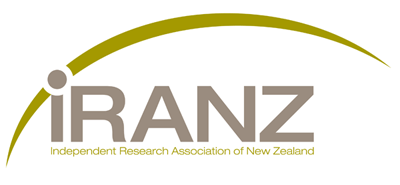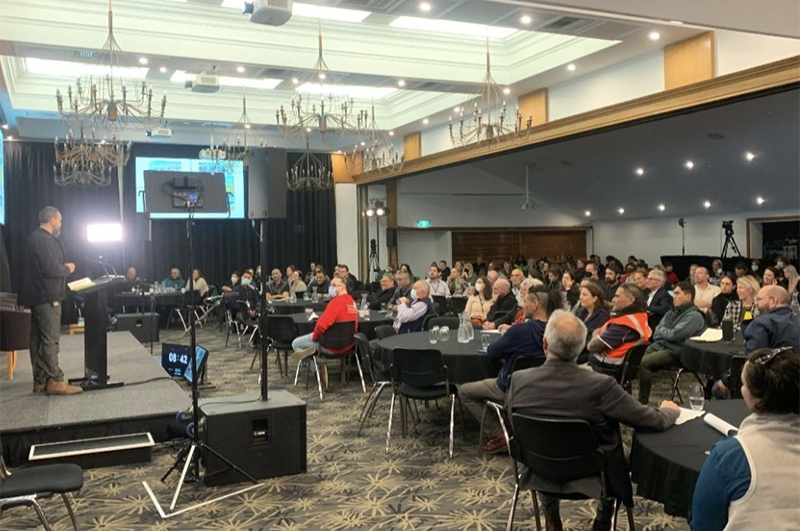Te Wānanga Whakamātaki a hit with biosecurity practitioners
Te Tira Whakamātaki's (TTW) inaugural Māori Biosecurity Symposium, Te Wānanga Whakamātaki, was held over three days at the end of July in the rohe of Te Ātiawa, Taranaki.
Co-hosted by Biosecurity New Zealand, the wānanga showcased the work of local Māori biosecurity practitioners and initiatives led by hapū/iwi and Māori communities. The symposium was an opportunity for hapū/iwi and Māori communities involved in the biosecurity system to come together for the first time nationally, and it highlighted issues in the system, but also opportunities to ensure Aotearoa New Zealand's biosecurity system is connected, well-resourced, and Tiriti-led.
“Encoded in our culture and language are solutions for numerous environmental and social issues so we need to reclaim our culture and language to access those answers,” says Te Tira Whakamātaki's co-founder Melanie Mark-Shadbolt.
Stuart Anderson, Deputy Director General of Biosecurity New Zealand, noted that “a successful biosecurity system requires all of us to work together.”
TTW lists the key messages from the symposium as follows:
- Local initiatives are ready to scale up: Local practitioners found meaning in the conference, and there is an expectation that the momentum gained through local biosecurity initiatives will continue. In particular, through funding avenues such as Jobs for Nature. Delegates were also inspired by rangatahi (young people), who are driven and passionate about the future state of te taiao (environment). People are critical to halting biodiversity decline in Aotearoa but require greater support and resource from central and local governments.
- Connecting biosecurity and conservation: The symposium demonstrated the disconnect between conservation and biosecurity initiatives. Future focus is to aim to work collaboratively with ministers and departments to ensure a connected and holistic approach.
- Tiriti-led requires the recognition of rangatiratanga: TTW want to ensure that the role of Māori in Aotearoa’s biosecurity system is meaningful, which requires an approach that is Tiriti-led. Distinguished speakers highlighted the importance of autonomous and co-governance models.
- Mātauranga is a knowledge system to support and enable: Mātauranga-a-hapū/whānau is critical to halting biodiversity decline. Delegates heard from several speakers about the centrality of Mātauranga for our hapū/whanau. It was also discussed how Government needs to be clear and intentional about its role in supporting and enabling mātauranga.
With close to 300 people in attendance, in-person and on-line, the speaker line-up boasted an array of industry stalwarts including Stuart Anderson and Stu Hutchings from Biosecurity NZ, Te Ahukaramū Charles Royal, Aroha Te Pareake Mead and panels of kaumatua and rangatahi. An added bonus to those who attended in-person was hearing the engaging and deeply personal stories of the gala dinner speakers, Dion Tuuta (Te Ātiawa) and former NZ Defence Minister Hon Ron Mark.
On the last day, the team and rangers from the Taranaki Mounga project, hosted guests for a hikoi through the Kaitake ranges, showcasing their pest management control infrastructure. Taranaki Mounga is a collaborative partnership between DOC, Iwi of Taranaki, NEXT Foundation and founding sponsors Shell New Zealand, TSB Community Trust, Jasmine Social Investments, and Manaaki Whenua – Landcare Research.
Recordings of the symposium presentations are available to registrants for three months following the event. TTW says that since the symposium, they have received a lot of positive feedback from attendees.
Te Tira Whakamātaki and Biosecurity New Zealand sign milestone MOU
The Māori Biosecurity Symposium included the signing of a Memorandum of Understanding (MOU) between Te Tira Whakamātaki and Biosecurity New Zealand. The MOU is a principles-based agreement between the two organisations, and commits the parties to a partnership that focuses on important biosecurity matters for Māori and Aotearoa. Melanie says they look forward to working with Biosecurity New Zealand and to building a working relationship that benefits Māori, Aotearoa, and te taiao.
More information
Find out more about Te Tira Whakamātaki (TTW).
Date posted: 19 September 2022

